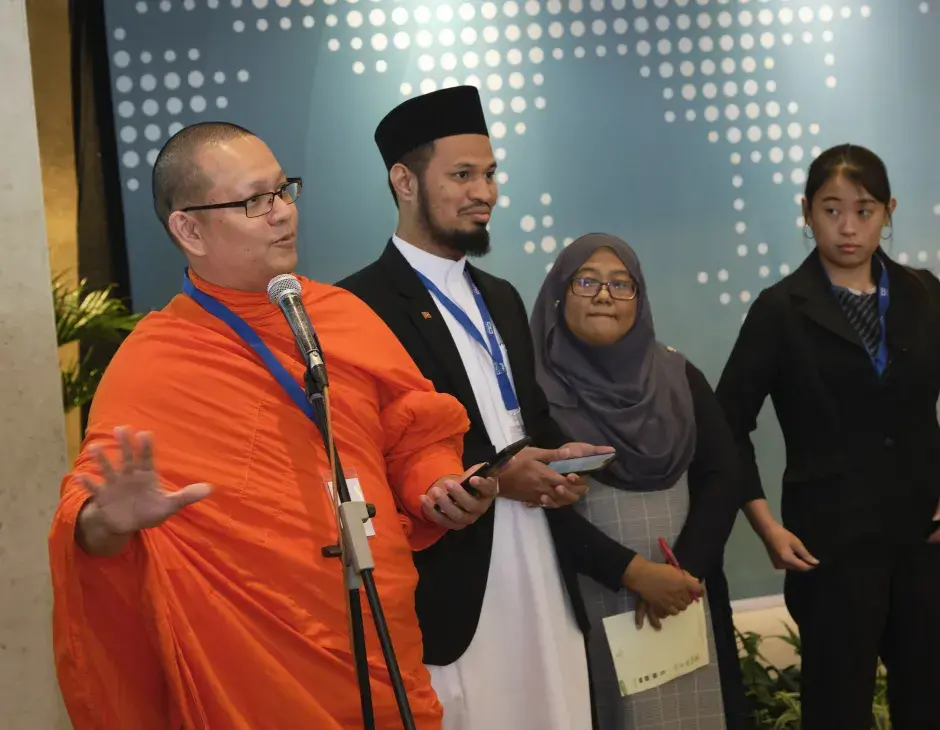Religious voices in Asia make key recommendations in areas of education, governnance and the environment
In the latest in a series of regional meetings forming part of the G20 Interfaith Forum process, over 55 pan-Asian religious leaders, representatives of faith-based organisations, senior policy makers, experts and researchers, met virtually today to make a number of key recommendations about how interfaith work in Asia can address challenges ranging from increasing access to education to climate change.
Today’s consultation follows similar meetings which focused on governance, coexistence, peace and the environment in the Arab region and displaced communities, inequality and the environment in Europe. The virtual forum marked the second and final day of the G20 Interfaith Forum Regional Consultation Asia.
Professor Katherine Marshall, Executive Director, World Faiths Development Dialogue, and a member of the G20 Interfaith Forum Advisory Council, outlined the importance of the recommendations made by the “network of networks.”
“While there will be specific issues that are on the immediate global agenda at any point, there are clearly some that have a lot of continuity,” she said. “I think that’s very much the spirit of the working groups that are focused on certain topics. For example, the refugee issue and the role of religious communities in dealing with the forced migration problems at the global level is one that is a consistent concern of religious communities from year to year.”
The agenda at today’s meeting, which saw participants contribute from across 16 different time zones and three working groups, made recommendations on an array of issues ranging from education, youth, the responsible use of social media, governance and faith and protecting the planet.
Dr Amjad Saleem, manager, Inclusion, Protection and Engagement at the International Federation of Red Cross and Red Crescent Societies, on behalf of the working group on Education, Youth and Women, recommended teaching the youth about the importance of common values. “We need to have an understanding of common values. Young people need to understand non-violent communication, they need to have the concept of mindfulness being inculcated into the education system. There needs to be an understanding of global issues. The role of religious leaders in helping to develop that curriculum is needed.”
Today’s recommendations formed part of the G20 Interfaith Forum process, which has connected religious communities from across the world this year to find new ways to tackle a range of challenges, including the ongoing impact of the coronavirus pandemic.
Professor Tatsushi Arai, professor of peacebuilding and conflict transformation at the Graduate Institute of the School for International Training, USA, and an expert in conflict resolution, conflict analysis, religion and identity, member of the Governance and Faith working group, made a number of recommendations for increasing the number of safe spaces for education. These included liaising with interfaith groups and policymakers.
“A safe space for education does emphasise religious traditional strength in having inspiration, seeking higher consciousness in ideological spaces,” said Professor Arai. “A focus on education not only in institutionalized sense of formal education, but also in non-formal education.”
The G20 Interfaith Forum offers an annual platform where networks of religiously linked and faith-based groups can dialogue on global agendas, within the broad framework of the United Nations Sustainable Development Goals (SDGs) and the host country agenda.
The International Dialogue Centre (KAICIID) considers Asia as one of its priority regions. The Centre first began working in Myanmar in 2016 and has expanded its activities to a number of countries in the region.
Sadhvi Bhagwati Saraswati, Secretary-General, Global Interfaith WASH Alliance, on behalf of the Protecting the Planet working group, spoke about the importance of religious organisations and civil society groups working together with grassroots workers to obtain guidance on sustainable solutions.
“Since climate and the environment intersects everything, our whole definition of peace needs to expand,” said Saraswati. “So when we speak, for example, about SDG 16 and peaceful societies, those peaceful societies cannot exist without clean air, clean water, clean soil. We cannot have peace without climate protection. Therefore the importance of all of the organisations working on SDG 16 is to really ensure that religious leaders are also working hand in hand on the environment.”
Saraswati also recommended greater engagement between religious groups and educators towards what she described as a “green faith movement.”
“Our faith leaders and faith based organisations educate not only in schools, but they educate in the community. We need to educate our communities to live their lives in concert with protecting the environment. People turn to their religious leaders for their faith, for their values, for their ethics, for their priorities to understand how we should think, how we should live, and the importance of the world of faith, harnessing that power, and ensuring that we are properly educating our communities on how to live sustainably.“
The International Dialogue Centre (KAICIID), with key partners the G20 Interfaith Forum Association, the United Nations Alliance of Civilizations (UNAOC) and Saudi Arabia’s National Committee for Interfaith and Intercultural Dialogue are jointly supporting the consultations with a final series of recommendations to world leaders attending the G20 summit scheduled to take place online in October.

